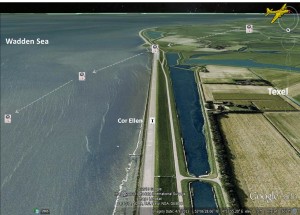
The situation was desperate onboard the severely damaged and badly smoking B17F Lonesome Polecat II as it headed out over the Wadden Sea towards England – losing altitude fast. The Polecat had fought a fierce aerial combat battle over Germany and was saved at the last moment when the American P51 escorts found them and drove off the enemy aircraft. Pilot Fred Delbern had ordered a bailout but only the three upfront crewmen had bailed out over Germany; the five crewmen in the rear of the aircraft did not hear the command due to the loud noises from their 0.5-caliber guns. As the flying fortress flew on for over 30 minutes toward the North Sea, the rear crewmembers remained in their fighting positions and waited for the final enemy attack that never came thanks to the P-51s!
My brother Eugene Darter had lost a one-on-one battle with a German ME 109 as he manned his 0.5 caliber machinegun. He was hit in the arm and leg, and he collapsed onto the aircraft floor, lying in a pool of blood. The other crewmembers were also wounded from both flak and enemy fire.
As the severely damaged bomber approached the coast of the Netherlands, Pilot Fred Delbern finally discovered that five crewmembers in the rear were still onboard and ordered a second bailout. One of my brother’s crewmates, Doral Hupp, discovered Eugene and stopped his bleeding, got him up, snapped his parachute on, and got him ready to bailout of the burning aircraft. Doral saved Eugene’s life, at least temporarily.
Eugene, apparently alarmed at the engine #2 and #3 fires, waddled past the other crewmembers. He told Doral he would be okay, and then he jumped through the rear side door that had been kicked out. His chute was seen by the crew to have “blossomed” as he vanished into the fog and clouds just below the aircraft. The four remaining crewmembers followed him out in less than two minutes and all four miraculously landed on an island, called Texel, Netherlands. They were captured by the Nazis quickly but their lives were fortunately saved by coming down on the only land 21 miles from the coast and the infinite North Sea ahead of the island. They all became POWs for the next 18 months but survived.
It was a cold and very foggy winter’s day on Texel Island with near freezing temperatures and a fierce wind blowing out to sea which was at high tide.
A 17 year old Dutch boy named Cor Ellen was standing below on the Wadden Sea dike and heard the low flying aircraft. Suddenly, an American airman flew directly over his head and was blown by a fierce wind out into the Wadden Sea, splashing down over 1,000 ft out from the dike. As he flew over Cor Ellen’s head, the airman screamed out “Help me, Help me”. He splashed down and was up to his neck in the freezing water of the Wadden Sea. Cor Ellen started running along the dike to get a small boat but as he turned around to see the airman, he saw an unforgettable sight as the parachute had come down into the sea water, but suddenly blew up into a half-moon and was pulling the airman quickly further into the sea; drowning the airman in its wake, as far as he could see. Eugene Darter was never seen again even though Cor Ellen watched for his remains to wash ashore for weeks.
When you think about the sequence of events, there were so many ways in which this tragedy could have turned out differently for Eugene.
- Delayed bailout by only 10 seconds – Eugene landed only 1,000 ft out in the Wadden Sea so if he had waited a few more seconds he would have come down on the island. Of course, neither he nor any of the crew knew where they were at the moment they bailed out due to complete cloud cover. They all thought they were over the freezing North Sea and certain death!
- Could have waited for his crewmembers to bail out – the next crewman went out about two minutes after Eugene and landed about ½ way across the 5 mile wide island. So just waiting for his crewmates would have likely saved his life.
- Wind had been blowing in any other direction and less severe than offshore – the wind was blowing out to sea and this was so strong that it carried Eugene over the dike and out into the Wadden Sea to his death.
- Could have disconnected his parachute after splashing down – the connection snaps were so strong, however, that with the loss of his right arm, the freezing temperatures, and loss of blood, he was unable to unsnap the parachute. This ultimately took his life when the fierce wind blew the parachute into a half-moon and pulled him out into the sea until he blacked out and drowned.
- Tide of the Wadden Sea would have been lower where Eugene splashed down – at high tide the water depth was up to his shoulders/neck. Had the tide been lower just two feet or so, he may have been able to walk into the shore or Cor Ellen would have been able to wade out and bring him to safety.
I met an American airman named Harold Kious on Texel who had bailed out (but not wounded) and splashed down in the same area in very cold weather. He told me that after he hit the water, he unbuckled his chute and began swimming to shore but within a minute he began to blackout and rolled onto his back. Then he began swimming again and everything went black again. This sequence repeated itself four times until he became unconscious. Fortunately for him, three Dutchmen pulled him out of the water from a boat and saved his life. But he told me that my brother’s last moments would not have been painful; he would have just blacked out and never recovered in the freezing sea water.
So Eugene paid the ultimate sacrifice for his country like so many others have done before and after him. So many things went wrong for Eugene on his first combat mission that he could not overcome, but he fought bravely, firing directly at the incoming German ME109 whose guns were blazing directly down at him and his crewmates. He was one of over 26,000 US and 55,000 UK airmen who lost their lives in the air war over Nazi Europe. Just six months later, D-Day was successful in part due to the success of the air war fought bravely by US and UK air crews. As Sir Winston Churchill famously said of these brave airmen, “Never in the field of human conflict was so much owed by so many to so few.”
